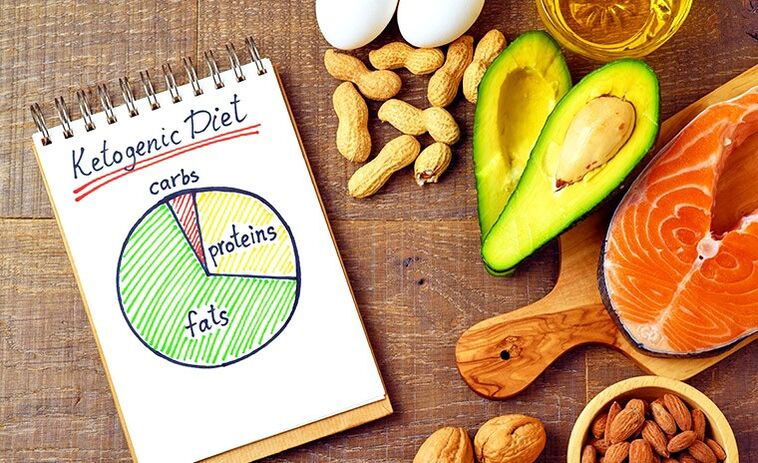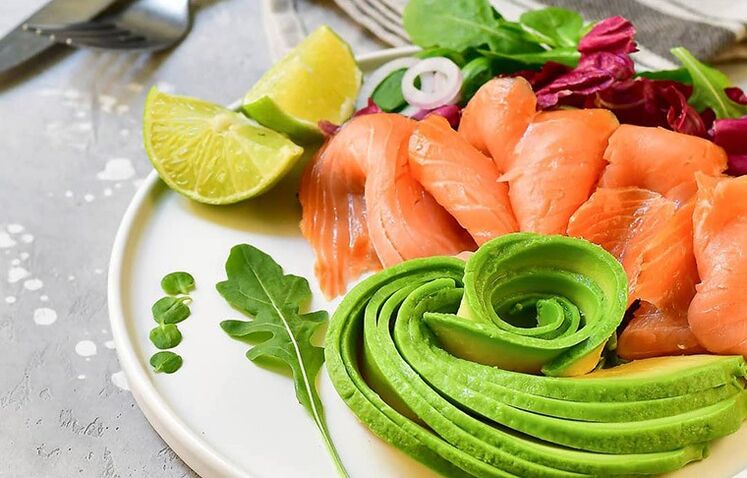
If twenty or thirty years ago someone put all the products in two baskets and sorted them according to the principle of their greatest and least use, today you will have to thoroughly review them. The most bizarre story at this time happened with the fats - humanity's recent main enemy is not only fully rehabilitated, but almost declared to be its savior. That's right, nutritionist Chris Moore understands.
Recently, a patient admitted to me and his wife eating almost a pound of bacon a week - three slices for breakfast, and then two more salads for dinner. I have been working as a nutritionist for over twenty years and nothing seems to surprise me, but then I still could not resist and asked: Why? The patient said that his wife was watching a TV show about the Keto diet and they decided to do it. Six months with bacon - now her husband has lost nine kilograms and, according to his wife, almost energy boils over him.
More and more often I hear from people about the miracles that the Keto diet does for them. They say it burns fat in the body, boosts energy and conquers diseases, and that from now on it is not only possible but necessary to eat as much bacon as you want. But all their enthusiasm needs a serious test anyway - is it really good to have a keto diet that does not restrict the intake of animal fats?
A ketogenic diet is a low-carbohydrate diet, high in fat and moderate in protein. It was originally used to treat epilepsy in children by increasing the level of ketone bodies in the blood.
What is ketosis?
Let’s start with the name of the diet: Where did this "Keto" come from? When the body is desperately short of carbohydrates - for example, due to diabetes or prolonged hunger - it must more actively burn its own fat to get energy. Ketosis develops: Metabolism is disrupted and more ketone bodies accumulate in the tissues. Ketone bodies are the products of fat metabolism. They are produced by the liver when insulin levels in the blood drop.
"The liver constantly creates ketone bodies, but their levels depend on the carbohydrates and proteins you eat - the body needs both, " explains Jeff Wallack, a professor at Ohio State University.
The breakdown of fat in the body of a healthy person and the formation of ketone bodies is a normal process, it is called ketogenesis. Unlike ketosis, ketogenesis does not cause dramatic weight loss. Ketosis is a pathology that, in addition to diabetes and prolonged fasting, can be caused by the keto diet as it almost excludes carbohydrate foods from the diet. People who have developed ketosis lose weight dramatically, as well as due to some other pathology.
A ketogenic diet forces the body to use fat as a major source of energy. Usually, this role is played by carbohydrates, which, when taken with food, are converted into glucose, which is very important for the nutrition and functioning of the brain. However, if the diet is low in carbohydrates, the liver converts fat into fatty acids and ketone bodies. Ketone bodies enter the brain and use it as an energy source instead of glucose. An increase in the level of ketone bodies in the blood (ketosis) causes a decrease in the incidence of epileptic seizures.
The main part of the daily diet in the keto diet - from 60 to 80% fats, proteins - about 15% and only the remaining 10% carbohydrates (this is a small cookie about half). At first glance, it looks like the Atkins diet, but the keto diet implies a more strict restriction of carbohydrates, says Spencer Nadolski, author of the recipe for fat loss. A number of theorists generally believe that the less carbohydrates we eat, the more fat the body burns, and for this reason, metabolism improves, immunity increases - and in general, various miracles happen in our body.
However, in normal life, we get about half of our calories and one tenth of them do not come from carbohydrates. So, essentially, the question is: can your body stay in ketosis long enough to reach the promised nirvana without serious health consequences? Will you literally start a relationship with fat?
Is the Keto diet right for you?
It may sound strange, but the best diet for you is the one you use. For Volk, who has been on Keto for twenty years, he is fine, but is he suitable for you? Unfortunately, there is no research on what happens in the human body that has been on the keto diet for a long time. In the A to Z weight loss study, the researchers looked at the Atkins diet, the Zone, the LEARN and some other diets, but in the study, female subjects consumed 25-35% of carbohydrates - not even a 10% limit on the keto diet.
The only thing that is known for sure: on the keto diet you will really lose weight. In Italy, in 2015, they studied the activities of people sitting on it and on average over three months they lost about 10-12 kilograms. A year ago in Spain it turned out that in one year in this way you can lose about 20 kilograms. It is true that over the next year, subjects often regained the weight they had before the experiment, as soon as they received a solid diet.
What will you eat if you decide to try it? First and foremost, this bacon. Many other products do not suit you. Starchy vegetables - potatoes, pumpkin, corn - are strictly forbidden, as are most fruits. Milk, beans, rice and pasta should also be forgotten.
Keeping a keto diet is difficult and can be dangerous for some. "Extreme diets, particularly the keto diet, are strongly contraindicated in people who have neurodegenerative diseases, such as epilepsy, " says Dr. Alan Aragon.
A ketogenic diet is considered to be optimal for weight loss in the community. However, according to scientific evidence, the effect of weight loss upon switching to a ketogenic diet is due to a reduction in the amount of water in the body, and only the energy balance affects the amount of body fat. For weight loss, the energy supplied by food must be less than that expended in physical activity. One of the benefits of a ketogenic diet, like other low-carb diets, is that ketosis, which occurs with low-carb diets, promotes weight loss in obesity. The difference in calories obtained can be up to a thousand kilocalories per day, compared to low-fat diets. The effect of ketogenic diets is significantly dependent on the protein content of the diet.
Can I take drugs that cause an increase in ketone bodies? no way. Do not listen to those "consultants" who will assure you that even without any diet you can cause ketosis with the help of special medications.
Is the Keto diet right for you? If you are an extreme athlete who is ready for your body experiments, if you want to take risks and fast results are important to you, then give it a try! If you just want to lose a few pounds and have already seen the "yo-yo effect" in the past (when after a strict diet a person loses weight and gains more weight than he managed to lose), then you probably do not risk it. However, if you approach Keto's diet wisely, you can learn three lessons from it that will really help you.
- Reduce your intake of "empty" carbohydrates. Analyze what foods you get from daily carbohydrate intake: If it comes from fruits that are rich in fiber and antioxidants, that's good, but if any food made from sweets, soda, and white flour is a carbohydrate, you know what to do: Feel free to dispose of them in the trash.
- Do not avoid fat. The craving for low-fat foods that began in the 90s may safely be a thing of the past. There is nothing good about that. Often, to compensate for the lack of fat, manufacturers increase the amount of sugar in these products. Eat fatty fish such as salmon, mackerel or sardines at least twice a week. And whatever you prepare, do not skimp on vegetables, especially good - olive oil.
- Eat lots of herbs. All leafy vegetables and herbs go well with fatty and protein foods - fans of the keto diet eat plenty of food. You did the same. Enjoy kale, spinach, bok choi, arugula and other salads without any restrictions.
What happened to my bacon patients? Their experiments on nutrition continued exactly until the birth of their child. Of course, they immediately forgot about diet (there is no time to think about it, as the young mother explained). So remember: sooner or later you will get bored of putting bacon in yourself on a regular basis and going back to the usual, familiar foods.
Recipes

Salmon and asparagus salad
Composition:
- 150 g of salmon fillet;
- 80 g of green arena;
- 1/2 head of iceberg lettuce;
- 2 eggs;
- Anke 4 fillets;
- 5 cherry tomatoes;
- 5 large capers (or 6-8 small ones) - Take the capers in salt and not in brine, you should wash them before use;
- 1/2 medium-sized red onion;
- 6-8 Art. Olive oil;
- 1 h. K. Dijon mustard;
- Juice of half a lemon.
How to cook
- If you have ever prepared nicotine, you can handle this salad too. It practically replicates Nice's main dish, using only fatty salmon instead of tuna, and using asparagus instead of green beans (although you can also use beans).
- Salmon is best cooked not in a hot pan or hot oven, but on a steamer or slow cooker: 20-30 minutes at 80-85 degrees, higher (otherwise the protein will tilt and the fish will become tough). You can also fry it in a pan (just do not overdo it! ) - the fish should be tender and retain some transparency inside.
- Cook the asparagus. It should be crispy, so do not boil! The cooking time depends on its size, so we do not recommend leaving the oven - to prepare the asparagus quickly.
- Place the crushed iceberg on a plate (salad should be washed, dried and crushed into medium-sized pieces), asparagus, salmon cut into large pieces, half a cherry tomato, anchovies, capers, onion cut into rings and hard-boiled egg. ). Top with Dijon mustard and lemon juice with olive oil sauce. You do not need to salt the dishes - the anchors and capers are already salty enough.
The ketogenic diet is used by athletes to maintain sports that require endurance such as ultramarathon, triathlon, cycling and more. The fat of athletes following this diet is used more efficiently as a source of energy and thus helps maintain glycogen stores. Long load.
Bacon and lettuce salad
Composition:
- 2 palm-sized lettuce heads
- 100 g of bacon;
- 8 branches of mint;
- 1 egg yolk;
- 6 p. m. K. Olive oil and a little more roast;
- 1 h. K. Grain mustard;
- 1 p. m. K. Lsher vinegar.
How to cook
- For this salad you will need to make a slightly more complex sauce: in a tall glass put the mint leaves and mustard, add the egg yolks, pour the sherry vinegar. Whisk in a blender while adding the olive oil in a thin stream.
- Cut the length of the salad in half and cook on high heat quickly. It should be slightly caramelized, i. e. acquire a golden brown color, clean and crunchy on the inside. Fry the bacon over high heat without oil or in the oven until crispy. Place the lettuce, bacon and sauce on a plate. Garnish with mint leaves.














































































